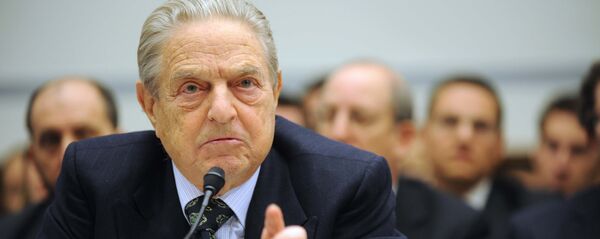Hungarian-born billionaire George Soros is fretting and fuming over the recent changes in the global political landscape. However, it appears that time is running out for "the man who broke the Bank of England."
Speaking to Sputnik, Wall Street analyst and investigative journalist Charles Ortel noted that Soros "began operating hedge funds well before promoting unregulated globalism in the 1988 to present period."
Indeed, the investor kicked off his first hedge fund in 1969, which in 1973 formed the basis for the Soros Fund. The would-be billionaire was rather successful, which apparently made him claim in his 1987 book "The Alchemy of Finance" that sometimes he had seen himself as "some kind of god or an economic reformer like Keynes, or, even better, like Einstein."
"European by birth, I suspect Soros fancies himself as a global citizen, rather than limiting himself to the (mere) US-EU plane of operations," Ortel opined. "What I believe happened since 1988 is that Soros and other proponents of unregulated (or lightly regulated) globalism have, in effect, waged a 'Thirty Years War' against workers across the world, while promoting sweet-sounding projects and causes that offer potential to score riches, either building out new global businesses, or profiting from adversity."
Thus, the dawn of an "unregulated" globalism coincided with the collapse of the Soviet Union in 1991 and the presidency of Bill Clinton (1993 — 2001).
READ MORE: Clinton, Sachs' Role in Post-Soviet 'Privatizations' Deserves Scrutiny — Analyst
According to the Wall Street analyst, the problem is that "so far, no global regulator (tax, legal, or otherwise) has emerged that can realistically police the activities of globalists, and few national regulators have the wherewithal to investigate and then prosecute complex transnational financial crimes."
"Until things change, wealthy globalists will easily tempt and even control national politicians, even (and especially) those in nations that have large economies or growth potential," Ortel warned.
Soros 'Harping' Against Conservatives Everywhere
The Wall Street analyst pointed out that "one of the pet peeves of George Soros is rising 'inequality,' while another practice is to harp against the US, and against economic conservatives everywhere."
For their part, conservative governments and movements in various countries, including Hungary, Poland, Italy and Israel, have repeatedly lambasted the billionaire for meddling in their domestic affairs through the network of his numerous NGOs and affiliated groups.
"[Soros'] approach, to date, has had a welcoming audience in the corporate media, in academia, in political parties such as the Democratic Party in the US (but also elsewhere), and with union leaders," Ortel remarked.
READ MORE: Covert Lobbying: Spanish Senator Unveils Soros' Influence Network in Europe
What Soros may miss is "the fact that technology, including social media, has reduced the relevance of all political parties, and now threatens, at last, to disrupt traditional governance practices," the investigative journalist highlighted.
According to Ortel, "the massive and expensive government bureaucracies stand out as places that must be reformed for many reasons."

Soros May Learn Soon That It's Unwise to Underestimate Trump
As for the US, "supporting Barack Obama, George Soros came very close to fundamentally weakening the rights of individuals, while almost cementing a perpetual Democratic majority," the analyst pointed out.
"Obamacare increased the vulnerabilities of all to [the] malign influence of a partisan health care 'super-bureaucracy.' Had Hillary Clinton won, Americans' gun-ownership rights likely may have been curtailed. And, Obama's reckless deficit-spending, borrowing, and campaigns against business-owners seriously eroded the relative standing of our economy (and nation)," he presumed.
It seems that Trump's rise to power might have eroded Soros' influence, which the latter enjoyed under Bill Clinton, George W. Bush and Barack Obama. The billionaire's recent gloomy prognoses are increasingly ridiculed not only by right-wing politicians, but also financiers.
READ MORE: How Eurosceptics Won the Day in Italy and Outplayed George Soros
Meanwhile, Soros' attempt to cast a shadow on newly-appointed Deputy Prime Minister Matteo Salvini's victory in Italy has not brought about a desirable effect either.
As Italian journalist Daniele Pozzati noted in an interview with Sputnik, "virtually nobody in Italy" took the magnate's assumption that Salvini could have been funded by Moscow seriously.
"Soros' allegations sound like a broken record," Pozzati noted. "They are frankly boring."
At the same time, according to Ortel, the investor is seemingly losing his wits, too.
"Supporting Hillary Clinton so aggressively and leading the 'Resistance' against Donald Trump suggests that George Soros now is much less shrewd than he once may have been," the analyst remarked.
However, it appears that Soros' concerns are justified, as Trump is really determined to destroy the magnate-advocated "world order," according to the analyst.
"Donald Trump saw these problems, and has attracted a highly competent team to attempt redressing malaise under Obama, while reversing, to date, some of the negative consequences of unregulated globalism," Ortel said. "So, given the vast financial and logistical support Soros provided to Obama, to the Clintons, and to other globalists, he should fear what the Trump administration is already doing, and what President Trump and his team likely will do in future."
Once fancied being omnipotent and even "divine," Soros is apparently facing what is called "the Twilight of the Gods."
"Perhaps Soros believes he is more powerful than any national politician," Ortel noted. "Soon, he may learn that [it] is unwise to underestimate President Donald J. Trump and forgotten men and women around the world who hardly believe they are 'deplorable' for cherishing what makes America, and many other nations, great in a variety of distinctive ways."
The views and opinions expressed by Charles Ortel and Ekaterina Blinova are those of the contributors and do not necessarily reflect those of Sputnik.



